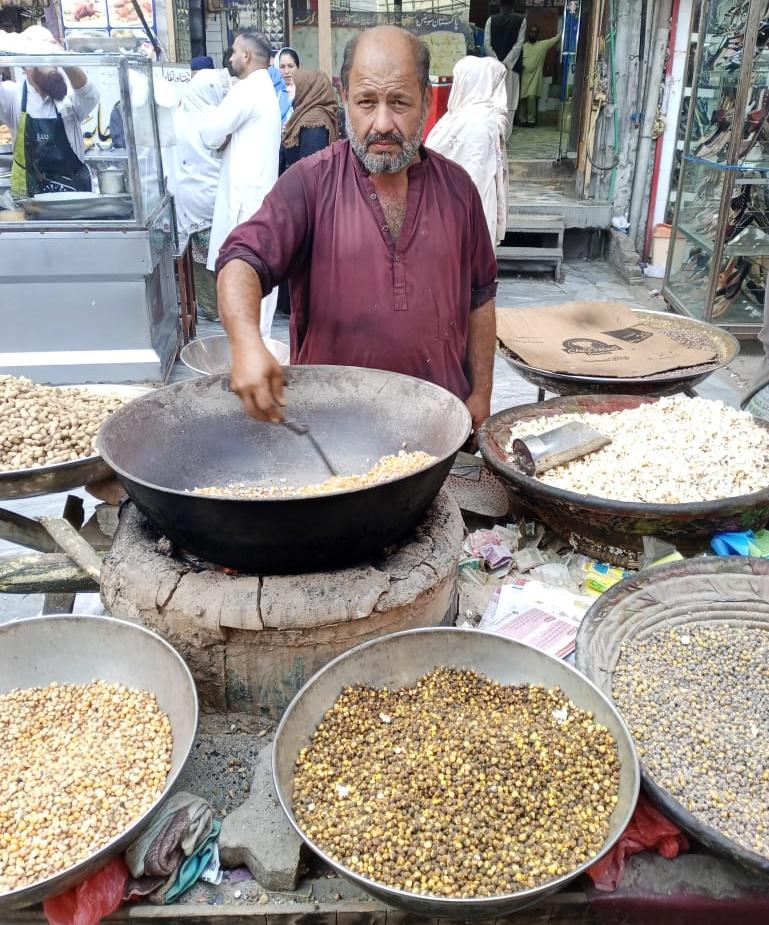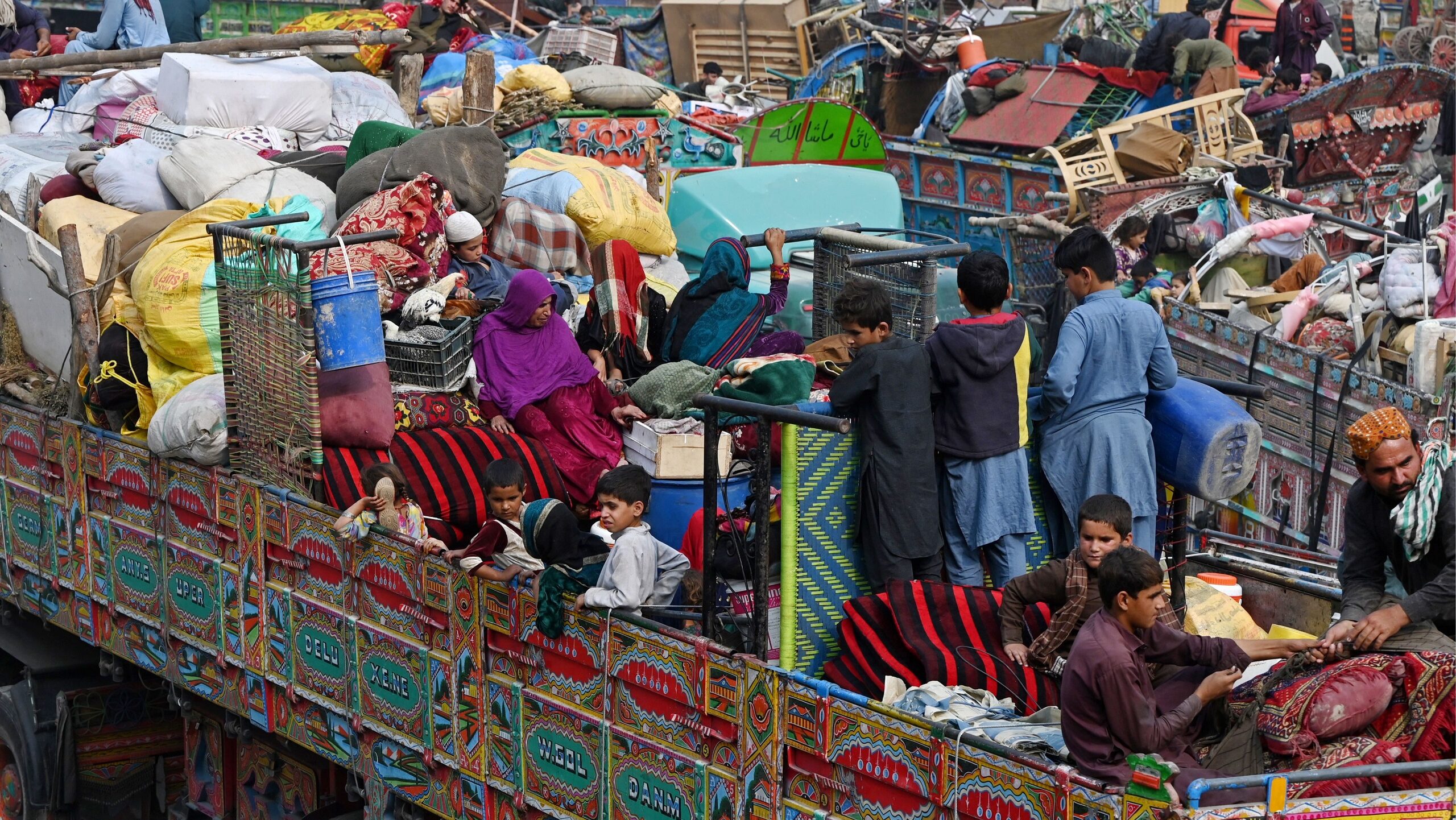Afghan Refugees in Pakistan Under Pressure as Deadline Passes for Undocumented Migrants To Leave
The Pakistani government has announced that it will expel an estimated 1.7 million Afghans illegally in the country, but human rights experts say the refugees may face serious risks if returned to Taliban-ruled Afghanistan
An estimated 1.7 million undocumented Afghan migrants in Pakistan are under mounting stress after the passing of Pakistan’s deadline for them to leave or face arrest and expulsion.
On Sept. 28, the Pakistani government gave undocumented foreign nationals until Oct. 31 to depart the country, warning that a mass eviction operation would begin on Nov. 1.
Although the government used the word “foreigners,” the focus of the action seems to be the large Afghan refugee population, who make up the majority of Pakistan’s undocumented immigrants.
We consider Pakistan to be our home. … Our kids are surrounded by this culture and speak the local language. Pakistan is the place where our elders and other departed family members are buried. To us, all of this appears to be a nightmare.
Abdul Rehman Khan, who with his family fled Afghanistan in 1979 after the Soviet invasion, has spent the past 30 years selling roasted peanuts, chickpeas, and corn out of a handcart in Rawalpindi, Pakistan.

Afghan migrant Abdul Rehman Khan earns a living for his family by roasting corn kernels and chickpeas on a wooden cart, in Rawalpindi, Pakistan. (Arshad Mehmood/The Media Line)
“We haven’t gone back to Afghanistan yet. We consider Pakistan to be our home,” Khan told The Media Line.
“Neither have we ever been asked to present identifying documents nor have we ever been required to do so. Our kids are surrounded by this culture and speak the local language. Pakistan is the place where our elders and other departed family members are buried. To us, all of this appears to be a nightmare.”
Khan said he was worried about his daughters’ education if they were forced to return to Afghanistan, where the ruling Taliban has prohibited schooling for girls beyond sixth grade.
The decision to expel undocumented migrants was made at a special meeting of Pakistan’s federal apex committee, chaired by the prime minister. The United Nations and human rights organizations expressed concerns about the decision, but Pakistani authorities have been adamant that no compromises will be made after Nov. 1.
Pakistan hosts one of the largest refugee populations in the world. It has served as a haven for millions of Afghans who fled during the Soviet invasion of 1979 to 1989. An additional 100,000 or so Afghans left their country after the Taliban retook power in 2021, many of whom fled to neighboring Pakistan. It is thought that 1.7 million of the 4.4 million Afghans residing in Pakistan are undocumented.
Azhar Ali, who works in fruit delivery in Peshawar, is another Afghan migrant whose life may be disrupted by Pakistan’s shifting policy.
He and his family returned to Afghanistan in 2017 after the UN High Commissioner for Refugees initiated a program offering benefits for voluntary returnees. After returning, their proof of refugee status cards and Pakistani residency documents were canceled.
“We barely made it back to Pakistan, due to the enormously unfavorable situation in Afghanistan, and we have since reapplied for papers. As things stand right now, it appears that we will be deported,” Ali told The Media Line.
Pakistan’s campaign to expel its undocumented migrants was launched amid a period of strained relations between Pakistan and Afghanistan. Pakistan has accused Afghan nationals of being involved in cross-border terrorism, targeted killings, violence against security forces, smuggling, and other incidents in Pakistan.
Many Afghan migrants in Pakistan are from the Hazara ethnic group, a Shiite Muslim community that has endured decades of brutal violence.
Being deported frpm Pakistan would be the same as being given the death penalty
Sakina Alizada is a Hazara woman who fled Kabul with her younger sister and widowed mother in 2021. They made their way to Quetta, Pakistan.
“Being deported from Pakistan would be the same as being given the death penalty,” Alizada told The Media Line.
She said her father had been a senior officer in Kabul during the rule of the previous Afghan government, which was overthrown by the Taliban in 2021, and Taliban fighters once broke into her home and took her and her family hostage in order to obtain information about her father.
Human rights activists and observers have said that deporting Afghan migrants back to Afghanistan might endanger their lives under the current Taliban rule there.
Amnesty International sent an open letter to the government of Pakistan, urging it to reverse its decision. Nobel Peace Prize laureate Malala Yousafzai also criticized the decision on social media, saying that Afghans seeking refuge in Pakistan “deserve support, dignity, and safety, not further obstacles and harassment.”
Pakistan’s Interior Ministry has stressed that it has no intention of extending the deadline for migrants to leave.
“The deadline won’t be extended,” Sarfraz Bugti, Pakistan’s acting interior minister, underlined during a press conference on Monday.
He said that illegal migrants will not “face maltreatment following their apprehension” and that they will receive food and medical treatment until their deportation. He warned Pakistanis against harboring illegal migrants, saying that anyone who does so will face harsh consequences.
Migrants will be permitted to take only 50,000 Pakistani rupees ($180) out of the country, he said.
At least 8,000 Afghan migrants were deported from Pakistan on Saturday at the Torkham border crossing, according to a statement released by the Taliban on Sunday.
The Afghan Ministry of Refugees said that 1,358 families were among the returnees.
Azam Khan, the caretaker chief minister of Khyber Pakhtunkhwa province, which borders Afghanistan, said in a statement that at least 60,000 Afghans have returned since the announcement of the deadline.
The UNHCR and the UN’s International Organization for Migration said that 78% of those who left Pakistan reported doing so out of fear of being arrested.
Suhail Shaheen, head of the Taliban Political Office in Doha, told The Media Line that Pakistani mistreatment of Afghan migrants “harmed the warm relationship between the two brotherly countries.”
“We are fully prepared to receive the returnees,” he said. “Twelve committees have been formed to tackle the issues of those Afghan refugees who are returning home. We also call on Afghan businessmen in Pakistan and other countries to return to their countries and participate in the reconstruction of war-torn Afghanistan.”
The decision to deport these individuals was made in accordance with international norms and moralities and was based on the nation’s internal laws
In response to the latest criticism of Pakistani policy from the Office of the UN High Commissioner for Human Rights, Pakistan’s Foreign Affairs Ministry said on Monday, “The decision to deport these individuals was made in accordance with international norms and moralities and was based on the nation’s internal laws.”
Foreign Office spokesperson Mumtaz Zahra Baloch said in the statement, “The government of Pakistan takes its commitments towards the protection and safety needs of those in vulnerable situations with utmost seriousness. Our record of the last 40 years in hosting millions of our Afghan brothers and sisters speaks for itself.”
On Oct. 27, Ravina Sham Dasani, a Geneva-based OHCHR spokesperson, published a statement urging Pakistan to suspend its policy.
“We call on them to continue providing protection to those in need and ensure that any future returns are safe, dignified, voluntary, and fully consistent with international law,” she wrote.
Qaiser Khan Afridi, a spokesman for UNHCR Pakistan, told The Media Line that Afghanistan is going through a severe humanitarian crisis and that the plans to expel Afghan migrants from Pakistan “would have serious implications for all who have been forced to leave the country and may face serious protection risks upon return.”
“UNHCR appreciates the generous hospitality of countries towards Afghan nationals for over four decades, despite challenges, and repeats the call for all returns to be voluntary, safe, and dignified, without any pressure, to ensure protection for those seeking safety,” he said.
A group of Afghan migrants staged a protest outside the UNHCR headquarters in Islamabad on Monday. The protesters, among them journalists, human rights advocates, defense attorneys, and those at risk from the Taliban, claimed that throughout the past two years, the UNHCR has not adequately looked into their cases.
The key damage will be the already fast-deteriorating ties between Islamabad and Kabul
Kamal Alam, a nonresident senior fellow at the Atlantic Council’s South Asia Center, told The Media Line that absorbing the refugees will not have “a huge impact” on Afghanistan, a country that is already dealing with isolation, sanctions, and humanitarian crises.
“The key damage will be the already fast-deteriorating ties between Islamabad and Kabul,” he said.
“This might not impact the security situation of the region directly. However, a deepening mistrust of Pakistan and Afghanistan will make it harder to coordinate counterterrorism for the region and various proxies will continue to gain an advantage,” he said.
Uzma Hamid Gul, a Rawalpindi-based geostrategic analyst, told The Media Line that the migrants “find themselves in a terrible situation since neither the Pakistani government nor the Islamic Emirate of Afghanistan is supporting them.”
Gul is the daughter of the late Gen. Hamid Gul, Pakistan’s former director general of Inter-Services Intelligence, who gained world fame during the Russian invasion of Afghanistan in 1979.
“American strategists believe that Pakistan is partially responsible for the humiliating US pullout from Afghanistan. Subsequently, American policy front-runners have no intention of seeing peace in this region. They are inflaming tensions between the two Islamic countries by manipulating Pakistan’s shoulder this time,” Gul said.
“There is a great deal of US interest in the restive Balochistan. The situation would become much more unstable if Afghans who have lived in Pakistan for three generations were forced to leave.”


